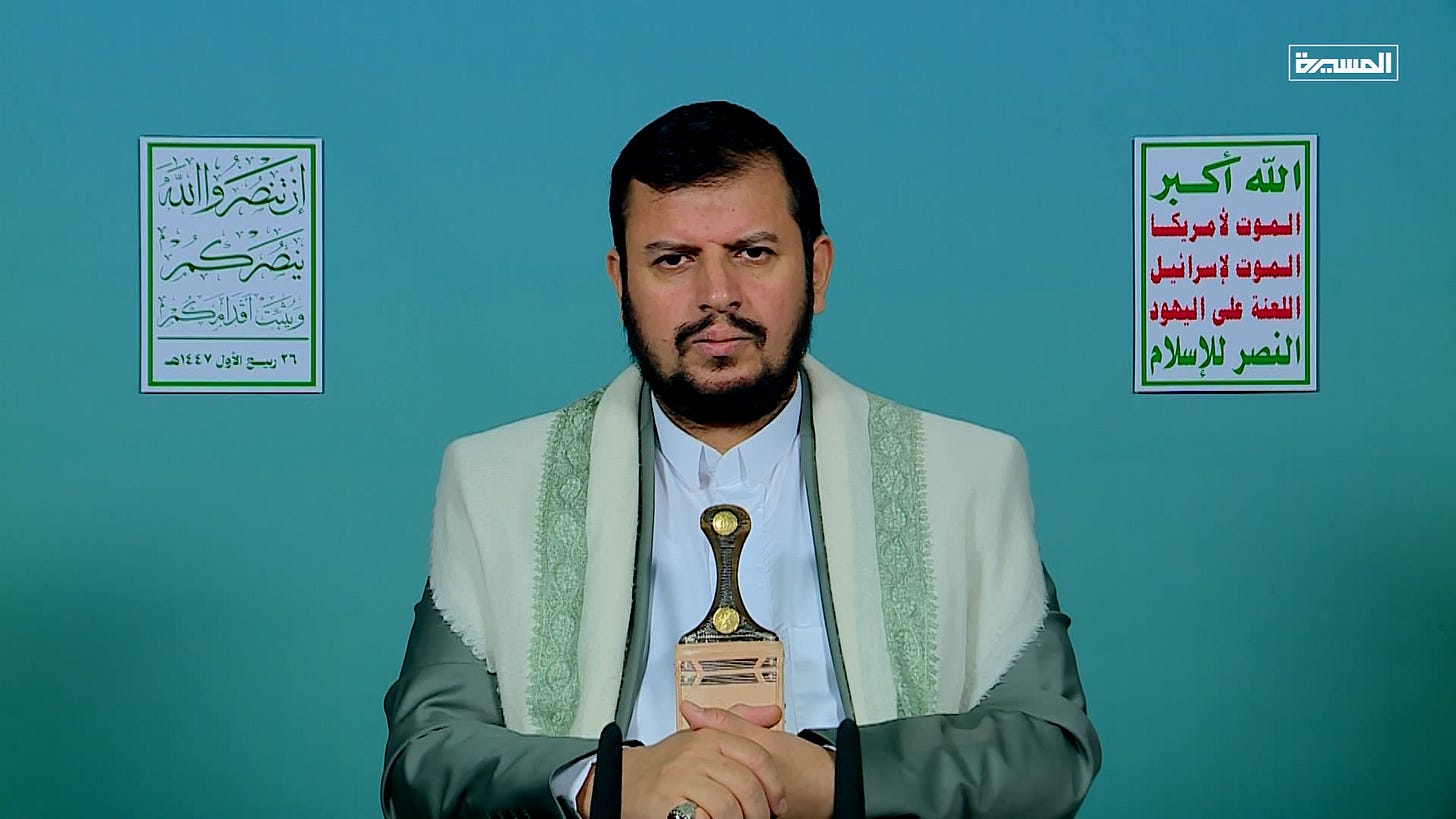Sayyed al-Houthi: Doha Summit Was Weak and Encouraged Enemy Violations
The Ansarallah Leader Slams Arab and Islamic Regimes for Issuing Empty Statements Instead of Concrete Measures
Yemen, PUREWILAYAH.COM – Sayyed Abdul Malik al-Houthi, leader of Yemen’s Ansar Allah movement, strongly condemned the outcomes of the recent Arab-Islamic summit in Doha, describing them as “weak and degrading” and warning that they only emboldened Israel to expand its aggression across the region.
In a televised speech on Thursday, al-Houthi said the absence of practical decisions from the summit proved disastrous for the Arab and Islamic nations.
“The Israeli enemy continues to threaten further violations after the summit, which confirms that its outcomes were low and weak, fueling the enemy’s ambitions to persist in violating Qatar and other states,” he declared.
“Shameful and Disgraceful”
Al-Houthi criticized the summit’s final statement for failing to rise to the level of the participants’ capabilities and positions of power.
“The Arab-Islamic summit should have had practical outcomes equal to the capacities and geographic positions of the participating states,” he said.
He noted that the summit communiqués amounted to little more than general descriptions. “It was shameful and disgraceful that the summit statement described Israeli aggression merely as an obstacle to normalization with Israel,” al-Houthi remarked.
“Have Arab and Islamic regimes reached the point of complete incapacity to take any practical stance?” he asked. “At the very least, there was no seriousness or sincere will to take real action.”
Missed Opportunities for Real Measures
The Ansar Allah leader outlined strong measures that could have been taken but were ignored.
The Ansar Allah leader presented a list of concrete measures the summit could have adopted:
“Severing relations with the Israeli enemy is possible and impactful, because it is Israel that benefits most from these ties.”
“Closing Arab and Islamic airspace to Israeli aircraft should have been declared, yet instead, they permitted the enemy to use their skies.”
“Lifting the ‘terrorist’ designation from Palestinian resistance factions such as Hamas, Islamic Jihad, and the Al-Qassam Brigades, and providing them with political, material, and media support.”
“Halting oil exports so that Israeli tanks and aircraft would not run on Arab fuel.”
“Have Arab and Islamic regimes reached the point where they no longer have any chance or option to take practical measures?” he asked, adding: “At the very least, there was no seriousness or sincere will to take a real stance, regardless of their political backgrounds.”
Comparing Arab and European Summits
Al-Houthi contrasted the Arab-Islamic summit with European summits, where massive financial and military commitments are announced for Ukraine.
European leaders announce billions in funding and arms for Ukraine, but the Doha summit could not even declare clear political or financial support for the Palestinian people.
“Why did the Doha summit not produce a declared commitment to support the Palestinian people?” he questioned.
He described it as shameful that the summit’s statement went so far as to describe Israeli aggression merely as an obstacle to normalization with “Israel.”
“The regimes did not pursue any options, foremost among them cutting ties with the Israeli enemy,” al-Houthi asserted. “Severing relations is both possible and effective, because it is Israel that benefits far more from such ties than the normalizing regimes.”
U.S. Complicity vs. Arab Inaction
Al-Houthi also underscored U.S. complicity, noting that Israeli Prime Minister Benjamin Netanyahu and the U.S. Secretary of State performed rituals together at the Western Wall during the summit.
“The American stance is practical and genuine, standing firmly with Israel, while Arabs do not even stand with one another, let alone with the Palestinian people,” he said.
He stressed that Arab and Islamic leaders were not asked to wage war on Israel, but simply to cut ties and stop enabling it. “We did not demand that governments go to war with Israel, but why not cut relations? Why not stop your support and cooperation with it?” he asked.
A Call for a Qur’anic Position
Sayyed al-Houthi concluded by urging the Ummah to return to the Qur’an for guidance in identifying the enemy and adopting effective solutions.
“Recognize the enemy through the Qur’an so your positions will be correct and effective,” he said. “Know the practical solutions through the Qur’an, so that you may move toward what is most upright, most beneficial, and most positively impactful.”
He warned that the weakness and inaction of Arab regimes in the face of Israel’s crimes encouraged further aggression, describing this as clear evidence of their abandonment of the Qur’an.
“It was shameful and disgraceful to see the summit deal with Israeli hostility in such a powerless way, while the enemy is filled with malice and ambition,” he stated. (PW)


